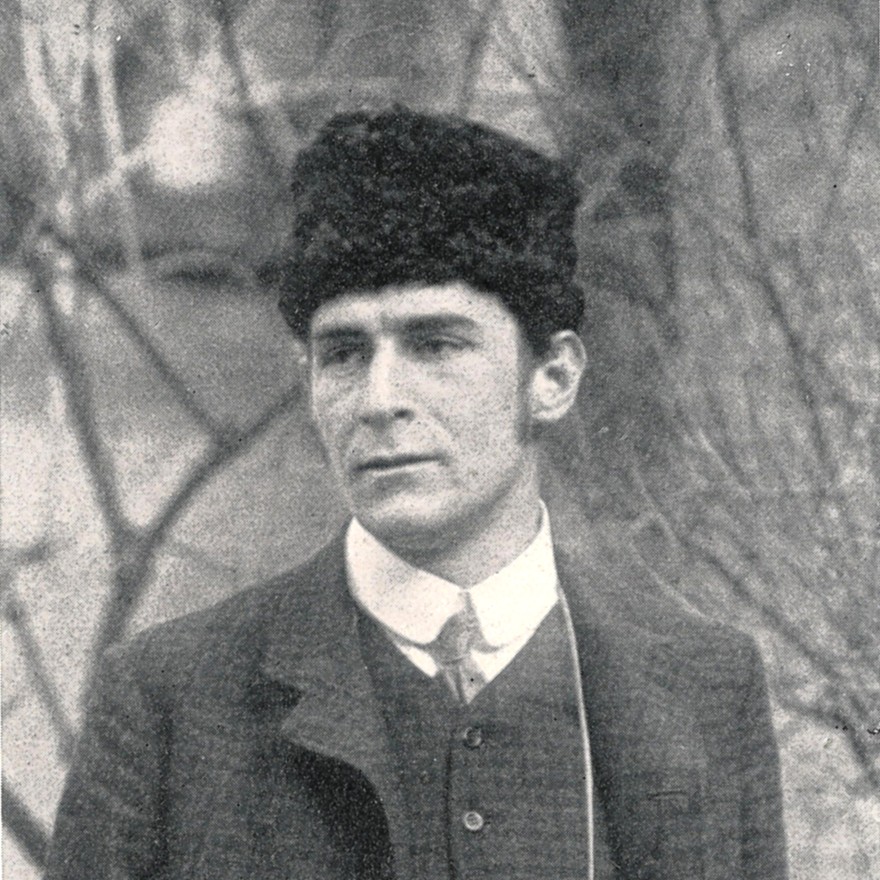Scholle
Quote from a letter to his brother (4 Dec. 1911); as cited in 'Lankheit, Almanac 14'; as quoted in 'Leaders', in Movement, Manifesto, Melee: The Modernist Group, 1910-1914, Milton A. Cohen, Lexington Books, Sep 14, 2004, p. 67
1911 - 1914
Franz Marc: Frases en inglés
Quote, (August 1914); as quoted in Franz Marc, horses, ed. Christian von Holst, Hatje Cantz Publishers, (undated), 15 December 1914, p.34
by the outbreak of World War 1. in August 1914 the animals had disappeared in Marc's art. Only colours and forms – the abstract – had to evoke the spiritual]
1911 - 1914
Quote of Franz Marc, in his text in the Almanac of the 'Blaue Reiter', 1912; as cited in Expressionism, a German intuition, 1905-1920, Neugroschel, Joachim; Vogt, Paul; Keller, Horst; Urban, Martin; Dube, Wolf Dieter; (transl. Joachim Neugroschel); publisher: Solomon R. Guggenheim Foundation, New York, 1980, p. 95
1911 - 1914
In a letter to his wife Maria (4 March 1916, the day he died by shrapnel), in Letters from the war: Franz Marc, new edition by Klaus Lankheit & Uwe Steffen, American University Studies, Vol. 16, p. 113
1915 - 1916
In a letter to Wassily Kandinsky, 1912; as quoted in Movement, Manifesto, Melee: The Modernist Group, 1910-1914, Milton A. Cohen, Lexington Books, Sep 14, 2004, p. 309 (note 23)
[in a letter, several months later to August Macke Franz Marc writes about the Futurist paintings he saw in Munich: '[Their] effect is magnificent, far, far more impressive then in Cologne' (where Marc had helped Macke with hanging the Futurist exposition)].
1911 - 1914
In a letter to August Macke, Nov. 1910; as quoted by de:Wolf-Dieter Dube, in Expressionism; Praeger Publishers, New York, 1973, p. 128
Franz Marc is reacting on Macke who focused in his exhibited works strongly on the independent power of color
1905 - 1910
from the front of World War 1.
In a letter to his wife, April 1915; as quoted in Artists on Art – from the 14th – 20th centuries, ed. by Robert Goldwater and Marco Treves; Pantheon Books, 1972, London, p. 444
1915 - 1916
Franz Marc's note on the reception of the second exhibition of the 'Neue KünstlerVereinigung' in Munich, September 1910; as cited by , in Expressionism; Praeger Publishers, New York, 1973, p. 125
1905 - 1910
Max Beckmann's opinion on this issue you find in: 'Quotes About Franz Marc', below
Fuente: 1915 - 1916, 100 Aphorisms', Franz Marc (1915), p. 445-446
1911 - 1914, The 'Savages' of Germany' (1912)
1911 - 1914, The 'Savages' of Germany' (1912)
from the battlefield at Verdun
In a letter to his wife Maria (2 March 1916), from the battlefield at Verdun; as cited in Letters from the war: Franz Marc, new edition by Klaus Lankheit & Uwe Steffen, American University Studies, Vol. 16, p. 113
1915 - 1916
Fuente: 1915 - 1916, 100 Aphorisms', Franz Marc (1915), p. 445
Quote in Marc's letter to August Macke, 1910; as cited by de:Wolf-Dieter Dube, in Expressionism; Praeger Publishers, New York, 1973, pp. 127-28
1905 - 1910
Quote of Franz Marc, in exhibition-text 'Die Blaue Reiter', Gemeentemuseum the Hague, Netherlands 2010
c. 1914/15, on the death of his close friend August Macke, who fell in the first months of World War 1.
1915 - 1916
Quote in Franz Marc's letter to August Macke, Dec. 1910; as cited by de:Wolf-Dieter Dube, in Expressionism; Praeger Publishers, New York, 1973, p. 129
1905 - 1910
Quote in a letter to Kandinsky, (c. Dec. 1911), quoted in 'Vezin 150'; as quoted in Movement, Manifesto, Melee: The Modernist Group, 1910-1914, Milton A. Cohen, Lexington Books, Sep 14, 2004, p. 67
1911 - 1914
In a letter to August Macke (14 January 1911); as quoted in August Macke; Franz Marc: Briefwechsel, Cologne 1965; as quoted in Boston Modern - Figurative Expressionism as Alternative Modernism, Judith Bookbinder, University Press of New England, Hanover and England, 2005, p. 35
Franz Marc visited a concert with music of the composer Arnold Schönberg on 11 Jan. 1911 with Wassily Kandinsky, Alexej von Jawlensky, Gabriele Münter and others; they played there compositions of Schönberg he wrote in 1907 and 1909: his second string quartet and the 'Three piano pieces'
1911 - 1914
Fuente: 1915 - 1916, 100 Aphorisms', Franz Marc (1915), p. 445
co-authored with Wassily Kandinsky
1911 - 1914
Fuente: Franz Marc's Manifesto for 'the Blaue Reiter' group, (1912); as quoted in Letters of the great artists – from Blake to Pollock, Richard Friedenthal, Thames and Hudson, London, 1963, p. 207
1911 - 1914, The 'Savages' of Germany' (1912)
In a letter to his wife Maria, (12 September 1914); in Letters from the war, p. 4. (in a slightly modified version 'In the Purgatory of War' (Im Fegefever des Krieges), Berlin newspaper Vossische Zeitung, 15 December 1914
1911 - 1914
Fuente: 1915 - 1916, 100 Aphorisms', Franz Marc (1915), p. 445
Fuente: 1915 - 1916, 100 Aphorisms', Franz Marc (1915), p. 445
near Verdun, 1915]
Fuente: 1915 - 1916, 100 Aphorisms', Franz Marc (1915), p. 446
quote from Franz Marc's note in 1907, he wrote down on his return from Paris; as cited by de:Wolf-Dieter Dube, in Expressionism; Praeger Publishers, New York, 1973, p. 126
1905 - 1910
1911 - 1914
as quoted by de:Wolf-Dieter Dube, in Expressionism; Praeger Publishers, New York, 1973, p. 126
1905 - 1910
Quote in Marc's letter to the publisher Reinhard Piper, 1908, as cited in Letters of the great artists – from Blake to Pollock, ed. Richard Friedenthal, Thames and Hudson, London, 1963, p. 207
1905 - 1910
